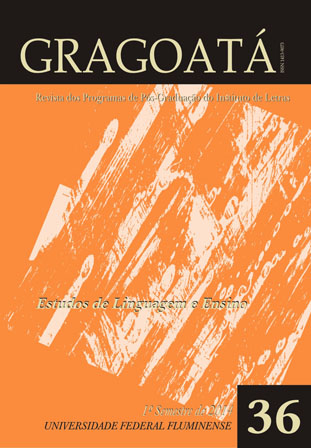Prosody and fluent reading
DOI:
https://doi.org/10.22409/gragoata.v19i36.32988Keywords:
Fluency. Oral expression. Reading. Evaluation of reading.Abstract
Expressive reading is a way to show that the reader is making sense of the meaning of a text. Therefore, oral expression in reading can make a distinction between good and poor readers, but can also be used to monitor comprehension. Fluent readers incorporate prosodic features of spoken language (accent, height variations of voice, intonation, phrasing and pauses) while reading, making it sound as natural as possible. This research shows the evaluation of the three prosodic dimensions, intonation and emphasis, phrasing and pace, in readings done by 2nd year high school students from four public schools in Belém, state of Pará. The results reveal a serious deficiency in the Portuguese language teaching in high school: most of the students have not reached a minimally acceptable level of fluency yet.Downloads
Downloads
Published
How to Cite
Issue
Section
License
Authors who publish in Gragoatá agree to the following terms:
The authors retain the rights and give the journal the right to the first publication, simultaneously subject to a Creative Commons license CC-BY-NC 4.0, which allows sharing by third parties with due mention to the author and the first publication by Gragoatá.
Authors may enter into additional and separate contractual arrangements for the non-exclusive distribution of the published version of the work (for example, posting it in an institutional repository or publishing it in a book), with recognition of its initial publication in Gragoatá.

Gragoatá is licensed under a Creative Commons - Attribution-NonCommercial 4.0 International.











